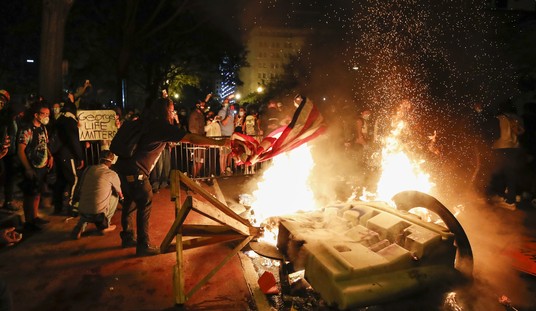Whether it is journalists caught on tape “discussing ways in which they could potentially embarass the Senate campaign of Republican Joe Miller” or Rep. Keith Ellison challenging an anti-voter fraud organization and getting counter-challenged himself, the political gloves on every side are coming off. People are acting like they don’t care if they make enemies, as if the last lap or the last round of the bout has come. Maybe it has. The Guardian described the stakes, describing Obama at a poorly attended rally warning the “gains” of the last two years were in jeopardy.
Thousands of empty seats at Barack Obama’s last campaign rally of the midterm elections today highlighted the decline in his popularity and the potential meltdown facing the Democrats at the polls on Tuesday. …
Speaking in Cleveland at the end of a whirlwind four-state tour , Obama said it was an important election. “We have the chance to set the direction of this country for many years to come,” he said. He warned that the Republicans could roll back all the progress of the last two years if they won big.
Janet Daley, writing from Britain, warns her readers to “prepare for a new American revolution.” That declaration may be premature because the revolutionaries are still in the process of getting their objectives straight and casting around for the means to take back the political parties. The revolution will not take place on election day, but it may begin there. Seizing Congress will not by itself solve the problem. However, the sheer ferocity of the campaign suggests that all sides see it as a Rubicon, which once crossed means that more is to follow. Perhaps nobody sees 2010 as an end, only as the beginning of a very fundamental struggle.
The proximate cause of the conflict, even though he is ultimately not its basic antecedent, is the president. The Washington Post calls Barack Obama the divider-in-chief. He didn’t create the fence; he simply made it impossible to straddle it. The president has made it necessary to choose political sides. In a way, Barack Obama has done more than any recent president to cast the issues starkly.
With the country beset by economic and other problems, it is incendiary that the president is not offering a higher vision for the nation but has instead chosen a strategy of rank division. This is an attempt to distract from the perceived failures of his administration. On issue after issue this administration has acted in ways that are weakening the office of the president.
One possible reason for the unparalleled degree of conflict is that the old truce is over. The old “go along to get along” idea has vanished. It its place is a zero sum game, with “friends” and “enemies.” Washington is now simply not big enough for two contradictory ideas, neither of which can abide the other. Charles Krauthammer quoted the president:
In a radio interview that aired Monday on Univision, President Obama chided Latinos who “sit out the election instead of saying, ‘We’re gonna punish our enemies and we’re gonna reward our friends who stand with us on issues that are important to us.'”
So if the president loses Congress, how will he make good on his threat to punish those who took it from him or let it happen? That avenging “we” isn’t going to be the now-Republican Congress. It will be the federal bureaucracy led by the executive branch. As Krauthammer notes, “over the next two years, the real action will be not in Congress but in the bowels of the federal bureaucracy. Democrats will advance their agenda on Obamacare, financial reform and energy by means of administrative regulation, such as carbon-emission limits imposed unilaterally by the Environmental Protection Agency.” That will be the main card for 2011, and what a humdinger it will be. If a conservative Congress attempts to cut back on the agencies, the giant bureaucracy will be fighting for its life. In that capacity it will be formidable. In zero-sum game against the president and the agencies, Congress may be the political underdog without allies.
Where will it find them? The only plausible allies that Congress can line up behind it are the states. The states are the other separate power in the federal structure. Their stake in the outcome is as great as anyone else’s. At some point in an all-in political conflict, especially when money and authority is concerned, the several states are likely to play a part in proceedings. It is unlikely they will watch completely passively from the sidelines. With Washington in a meltdown and a divided capital struggling in unparalleled acrimony, there’s a possibility the states will be drawn in, perhaps through Interstate Compacts, or simply through political persuasion. What will they do about ObamaCare, financial reform, and carbon emissions?
What may occur after the Tea Party breaks over the capital is not that the wave will dissipate, but that the impetus will return to to the states and spread downwards from there. If 2010 was the year of the battle for Congress, 2011 may well be the year of the struggle for the grassroots. Act I is about to end. The curtain will soon rise on the second.










Join the conversation as a VIP Member